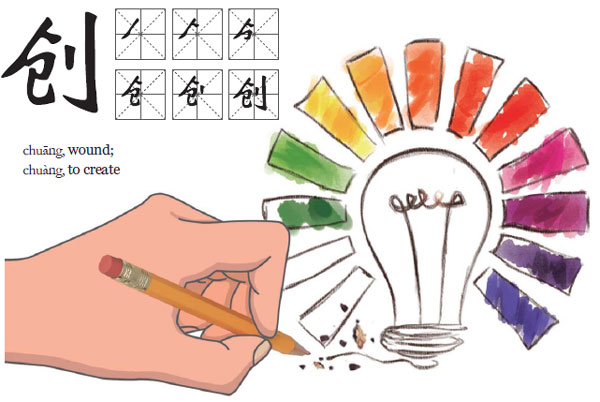The pain of creativity

One character encompasses the meaning to start something new and wound or trauma, making a philosophical statement of its own
Whether you are a writer, an artist, an entrepreneur, or hold any of the thousands of jobs in the world that require imaginative solutions, creativity, or 创造力 (chuàngzàolī), is what drives many of us.
However, staying creative - despite self-doubt, criticism and difficult work - is no easy task. It involves drawing the status quo into question and destroying preconceptions, often at great personal risk.

This vantage point puts us in a better position to tackle one very special character: 创. It is a character that means both to start something new and wound or trauma, with a slight variation in tone. With its dual meanings, the character for creation signifies the arduous journey endemic in creating something entirely new.
To create, you first have to suffer. Judging by the evolution of the written form, we know that the character 创, meaning wound, appeared much earlier than the one for creativity. More than three millennia ago, it first appeared in the form of bronze script. Some have posited that the script's pattern indicates a person lying on the ground with incisions on the limbs; others say it is a blade dripping with blood. Either way, its original definition was not debatable, meaning to cut wounds.
As the character developed, the original pattern was simplified and became a radical, or part of a Chinese character, and at the same time another radical, 倉 (cāng), was added on its left to denote pronunciation. The end result is 創, the traditional form of the character 创. When it refers to wound as a noun, the first tone (chuāng) is used.

Many words and phrases rely on the character, and all relate to its painful origins. 创口 (chuāngkou, wound) is a word you will most likely hear from surgeons, and when discussing surgery, you may want to choose a plan of action that uses the least invasive techniques, which is 微创 (wēichuāng). Surgeons refer to surface wounds as 创面 (chuāngmiàn) when they are discussing their cleaning or healing.
The character does not just refer to physical wounds, but also psychological or emotional trauma. For instance, the word 创伤 (chuāngshāng) can mean both physical and psychological injury. For instance, "战争给人们的心灵留下了深深的创伤。 (Zhànzhēng gěi rénmen de xīnlíng liú xià le shēnshēn de chuāngshāng.)" means "War leaves deep wounds in people's hearts." To refer to the pain and suffering caused by such injuries, use the word 创痛 (chuāngtòng).
The meaning of wound also expands to include setbacks in other areas. For example, when the economy takes a hit, we say 经济受创 (jīngjì shòuchuāng); when one's career is on the rocks, it is 事业受创 (shìyè shòuchuāng); and when someone's ego gets hurt, we can even say 自尊心受创 (zìzūnxīn shòuchuāng).
When 创 is used to mean to start something new, and when it is used as a verb, the fourth tone (chuàng) is used. Originally, this meaning belonged to the character 刱 with the same pronunciation. But the former became immensely more popular in daily usage, so much so that the latter character was rendered obsolete.
创造 (chuàngzào), or to create, is the word you want to remember when describing creation on a grand scale, such as in 创造文明 (chuàngzào wénmíng, to create a civilization), 创造历史 (chuàngzào lìshǐ, to create history), 创造纪录 (chuàngzào jìlù, to set a record), and even 创造奇迹 (chuàngzào qíjì, to create a miracle).
For something specific, it depends on what you are creating. If it is literature or art, use 创作 (chuàngzuò); if it is a publication, use 创刊 (chuàngkān); and if it is to establish a school, a company, or an organization, use 创办 (chuàngbàn), with the founder of the organization being 创始人 (chuàngshǐ rén). To start a website, use the word 创建 (chuàngjiàn) and to create a new school of thought or a new theory, use 创立 (chuànglì). But, this is not to be confused with 创利 (chuànglì), which means "to create a profit". To do that, we have to start an enterprise first, which is 创业 (chuàngyè). Entrepreneurs are actually 创业者 (chuàngyèzhě). With all this in mind, it should be clear that the subject at hand decides which verb should be used.
We celebrate and appreciate genuine creativity and out-of-the-box thinking; the word 创意 (chuàngyì) represents just that, a brand new concept or fresh ground, often in an artistic sense. In the modern world where technology grows ever more integrated, 创新 (chuàngxīn), or to bring forth new ideas, is often heard in regard to science and technology. In a world of innovation, the route to the unprecedented is the quickest to success; it is the best way to ensure that your idea will be 创见 (chuàngjiàn, an original idea) and your work will be 创举 (chuàngjǔ , pioneering work).
What are you waiting for? Set your mind free and go and be creative, it is the easiest and most painful thing in the world.
Courtesy of The World of Chinese, www.theworldofchinese.com
The World of Chinese
(China Daily European Weekly 06/12/2015 page27)
Today's Top News
- Japan tempting fate if it interferes in the situation of Taiwan Strait
- Stable trade ties benefit China, US
- Experts advocate increasing scope of BRI to include soft power sectors
- New engine powers cargo drone expansion
- China to boost green industry cooperation
- Manufacturing PMI rises in November






























